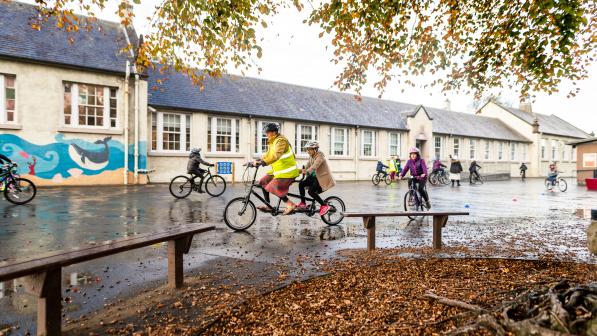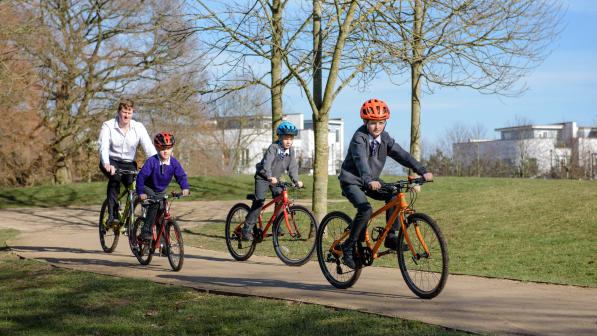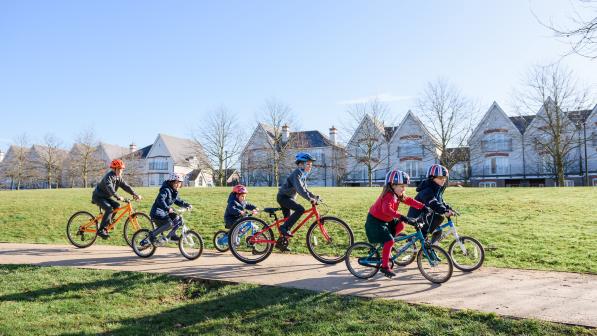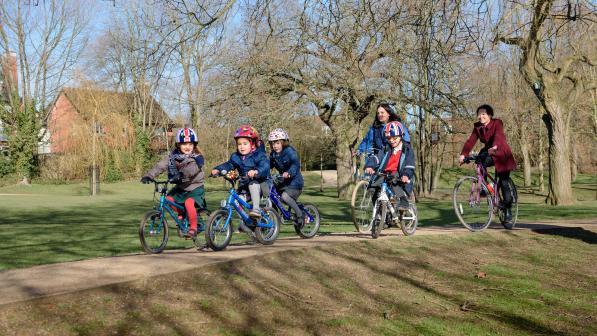How to bike buses

In October, Cycling UK had it's first ‘cycle campaigners social’, the idea behind it is to have a space for fellow campaigners to meet a few times a year with food, drink and at least some talks/interviews/films/panels relevant to cycling.
A huge thanks must go to Meg and PJ (and everyone else involved in the North Belfast bike buses) for showing up and sharing their knowledge.
Both are members of the North Belfast Cycle Campaign Group, and during ‘Cycle to School’ week they successfully organised a series of ‘bike buses’.
The term ‘bike buses’ can be quite new to some people - they are not, as I have often been asked, a bus full of bikes, or even a bus powered by cycling, but simply a group of children who want to cycle to school and a group of adults who ‘escort’ them so they arrive safely. The whole point of the bike bus is to point out how our government has some serious work to do in order for children to be able to cycle to school safely without parental (and in one case police!) supervision.
These are some of the tips and ideas shared by Meg and PJ about running a bike bus:
What is a bike bus and why do you do it?
First and foremost, it is a protest highlighting the fact that we can’t get children to school safely with current infrastructure, secondly it is a practical way to get your children to school – eco-friendly, active travel and gets them to spend time outside.
Most children live very close to their primary school, so the number of cars you see around the schools at pick up and drop off times are completely unnecessary.
Can you share some practical tips for getting started?
A grey area is liability and insurance – we did it by saying parents had to accompany their children. The idea of crowdfunding or getting grants to fund the lead rider is a much more sustainable model.
We let the lollypop lady know when we were coming, and had the police with us one day which was useful as there was a traffic issues involving a lorry and they had the authority to direct them to pull over and wait.
We didn’t want to exclude anyone, but we did have to have guidelines – any child had to be able to cycle the distance unaided as you don’t want the group to split.
We did a big push all week for more participants and focused it on the Friday, which was by far and away our most successful day.
How was working with the school?
We had the support of the school but there were no teachers/staff involved. It’s a good idea to work closely with the school, Meg is a school governor and helps run the PTA so is in those networks.
The school helped by putting out our flyer to all pupils and parents, but couldn’t offer liability insurance.
Another school in the area does a walking bus, so it’s not a completely alien concept.
Was it difficult to choose a safe route?
We kept the route really short and simple, so we didn’t have to cross any junctions, there were 2 roundabouts and we stayed on the school side of them, so we didn’t have to turn.
There was an advantage of the road being single carriageway, as there is no weaving in and out of parked cars, and it's very slow for cars anyway at that time in the morning so once we were out, we could occupy that space on the road – the whole week only one car passed us, which did feel a little scary.
Are there any tips to remember for the day itself?
- Put the youngest rider at the front to set the pace.
- Try not to break up the cycle bus, you all want to move through together.
- Have your blockers out front – ours included a cargo bike. They affect the traffic to allow the bike bus to come through.
Did you see any immediate changes?
The children became much more confident on that route as the week went on.
Car drivers seemed to adapt over the week, they accepted they wouldn’t get where they were going any faster if we weren’t there.
How can we use it to campaign for change?
Kids, school and active travel is a very good entry point with politicians, they are very interested in how kids get to school, and it is something that comes up time and time again.
Almost all of us experience it, whether we are parents doing the school run, or are in traffic caused by the school run.
Videos of kids on bikes are twitter gold, most likes and retweets are around things like this.
Visibility was key, we noticed behaviour of drivers improved as the week progressed because we were there every day.
The experience was so positive that having just a handful of children in the dark over winter might sour it slightly – in Scotland they stop over winter for a couple of months. It's important not to turn a positive into a negative.
What are the short-term goals for the North Belfast bike buses?
Keeping it going – trying to grow it. We want to keep it going once a week, I think we will likely see behaviour change from drivers on that road, they may consider walking or cycling themselves.
Children from other schools also saw us and they may then push for it for their own schools.
And your long-term goals?
Imagine you got a whole bunch of these happening at schools around the city and what that would do to change behaviour. It would be good to see areas where there are a cluster of schools running bigger buses together.
If there was segregated infrastructure, we could have let many more children join without their parents.
What changes do you want to see from campaigning?
Pedestrianisation of streets in Belfast would make a big difference.
Would love to see schools start to advocate more – if they banded together they would be quite a powerful lobby, especially schools in a similar area.
There just doesn’t seem to be that momentum at the moment from the schools – they are such big players in this.
I think the side streets where the children come from are used as rat runs, a strategy for quiet neighbourhoods would make a big difference for the school runs – implementing a one-way system on some streets and other measures to stop rat runs.
Listen to a more in-depth interview with cycle campaigner, Meg Hoyt
Before the event took place, we managed to get some time with Meg to talk a little more about her experience as a campaigner and what led to her starting the bike bus. It was intended to be ‘15 minutes with Meg’, but she gave us so much good content we had to stretch it to ‘25 minutes with Meg’.



